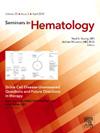Palliative care needs of patients with hematologic malignancies and family caregivers and challenges of palliative care provision in Asia: A review of evidence
IF 5
3区 医学
Q1 HEMATOLOGY
引用次数: 2
Abstract
Patients with hematologic malignancies often experience fatigue, lack of vitality, and energy, and high psychological distress. High levels of unmet care needs of patients with hematologic malignancies in Asia were identified. This review provides an overview of current evidence on the experiences and palliative care needs of patients with hematologic malignancies and their families and the barriers and challenges of integrating palliative care into hematology care in Asia. Patients with hematologic malignancies who received palliative care could benefit from less aggressive end-of-life treatments. However, the uncertain and variable nature of the prognosis and illness trajectories of hematologic malignancies increase the difficulties of integrating palliative care into hematologic care. Patients and their families are often referred to palliative care services late, which leaves a short window for palliative care teams to provide holistic needs assessment and person-centered care for those who need it. In addition, cultural differences in medical decision-making patterns and complex social norms and interactions among patients, families, and healthcare staff make it even more challenging to initiate palliative care conversations in Asia. Future research should focus on the development and evaluation of culturally appropriate palliative care for patients with hematologic malignancies and their family caregivers in Asia, given that the low rate of service intake and poor public awareness of the important role of palliative care in disease trajectories were reported. The socio-cultural context surrounding individuals should be taken into consideration to ensure the provision of person-centered care for this group of patients. Digital health could be one of the possible solutions forward to address local needs and challenges.亚洲血液恶性肿瘤患者和家庭照顾者的姑息治疗需求和姑息治疗提供的挑战:证据综述。
恶性血液病患者经常感到疲劳,缺乏活力和能量,以及高度的心理困扰。确定了亚洲血液恶性肿瘤患者的高水平未满足的护理需求。这篇综述概述了目前关于血液恶性肿瘤患者及其家属的经历和姑息治疗需求的证据,以及将姑息治疗纳入亚洲血液护理的障碍和挑战。接受姑息治疗的恶性血液病患者可以从较低侵略性的临终治疗中获益。然而,血液系统恶性肿瘤的预后和疾病轨迹的不确定性和可变性增加了将姑息治疗纳入血液系统护理的困难。患者及其家属转诊到姑息治疗服务的时间往往较晚,这使得姑息治疗团队无法为有需要的人提供全面的需求评估和以人为本的护理。此外,医疗决策模式的文化差异以及患者、家属和医护人员之间复杂的社会规范和互动,使得在亚洲开展姑息治疗对话更具挑战性。未来的研究应侧重于为亚洲血液恶性肿瘤患者及其家庭照顾者开发和评估文化上合适的姑息治疗,因为据报道,亚洲的服务接受率较低,公众对姑息治疗在疾病发展轨迹中的重要作用认识不足。应考虑到个人周围的社会文化背景,以确保为这组患者提供以人为本的护理。数字医疗可以成为解决当地需求和挑战的可能解决方案之一。
本文章由计算机程序翻译,如有差异,请以英文原文为准。
求助全文
约1分钟内获得全文
求助全文
来源期刊

Seminars in hematology
医学-血液学
CiteScore
6.20
自引率
2.80%
发文量
30
审稿时长
35 days
期刊介绍:
Seminars in Hematology aims to present subjects of current importance in clinical hematology, including related areas of oncology, hematopathology, and blood banking. The journal''s unique issue structure allows for a multi-faceted overview of a single topic via a curated selection of review articles, while also offering a variety of articles that present dynamic and front-line material immediately influencing the field. Seminars in Hematology is devoted to making the important and current work accessible, comprehensible, and valuable to the practicing physician, young investigator, clinical practitioners, and internists/paediatricians with strong interests in blood diseases. Seminars in Hematology publishes original research, reviews, short communications and mini- reviews.
 求助内容:
求助内容: 应助结果提醒方式:
应助结果提醒方式:


